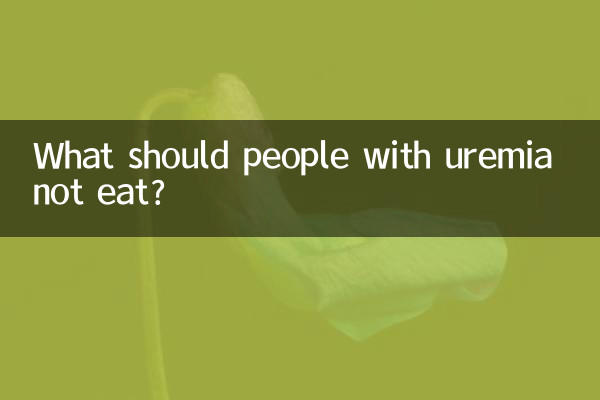What should people with uremia not eat?
Uremia is the end-stage stage of chronic kidney disease. The patient's kidney function is severely damaged and unable to properly filter and excrete metabolic waste from the body. Therefore, dietary management is crucial for patients with uremia. Wrong diet may aggravate the condition or cause complications. The following is a list of foods and related precautions that uremic patients need to avoid or limit.
1. High potassium foods

In patients with uremia, the ability of the kidneys to excrete potassium is reduced, which can easily lead to hyperkalemia, which may lead to arrhythmia or even cardiac arrest. The following high-potassium foods need to be avoided:
| food category | specific food | Potassium content per 100g (mg) |
|---|---|---|
| Fruits | Banana, orange, kiwi, cantaloupe | 300-500 |
| Vegetables | Spinach, potatoes, mushrooms, tomatoes | 400-600 |
| Nuts | Almonds, peanuts, cashews | 600-800 |
2. High phosphorus foods
Phosphorus metabolism disorder is a common problem in uremia, and high phosphorus can lead to bone lesions and vascular calcification. The following foods need to be restricted:
| food category | specific food | Phosphorus content per 100g (mg) |
|---|---|---|
| dairy products | milk, cheese, yogurt | 150-300 |
| processed food | Sausage, ham, canned food | 200-400 |
| Beverages | Coke, beer | 50-100 |
3. Foods high in salt (sodium)
Excessive sodium intake will aggravate edema and hypertension, so daily salt intake needs to be strictly controlled (recommended <3g/day):
| food category | specific food | Sodium content (mg/100g) |
|---|---|---|
| condiment | Soy sauce, bean paste, MSG | 1000-5000 |
| Pickled products | Pickles, bacon, pickles | 800-3000 |
| Snacks | Potato chips, biscuits, instant noodles | 500-1000 |
4. Selection of high-protein foods
The total amount of protein needs to be controlled, giving priority to high-quality proteins (such as egg whites, fish) and avoiding plant proteins (such as soy products).
5. Other taboos
1.carambola: Contains neurotoxins that may cause convulsions or even coma.
2.High sugar foods: Patients with diabetic nephropathy need to be strictly restricted.
3.Alcohol: Increase the burden on the kidneys and interfere with drug metabolism.
Summary of dietary recommendations:
1. Daily water intake needs to be adjusted according to urine output, usually the previous day’s urine output + 500ml.
2. The main cooking methods are steaming and boiling, and avoid frying.
3. Regularly monitor blood potassium, blood phosphorus, blood calcium and other indicators, and adjust the diet plan in a timely manner.
4. It is recommended to formulate personalized recipes under the guidance of a nutritionist.
Dietary management for patients with uremia requires long-term persistence. A scientific and reasonable diet can effectively delay the progression of the disease and improve the quality of life. If you have any questions, please consult a professional doctor or nutritionist in time.

check the details

check the details